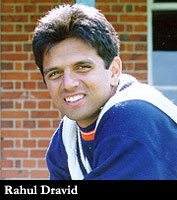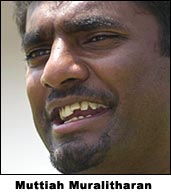 Home > Cricket > Diary archives
Home > Cricket > Diary archivesSeptember 20, 2001
Preparing for the Proteas
Faisal Shariff
Barry Richards, the legendary South African batsman once said that he set himself small goals while he was batting. He would aim to score ten runs at a time; he would tell himself that he was good enough to score ten runs against any attack.
If you think that is a real small goal, listen to Rahul Dravid's version.
"I try and look at it as one ball at a time. The most important thing to realise when you are batting is that the only thing that decides your fate, your score, your career or anything else, is that next ball."
That next ball awaits him in South Africa as the Indian team goes there after almost five years, for what will be the toughest tour for India this year, what with a load of expectations packed in its kit bag.
 The last time India toured South Africa, Dravid, then in only his second
year in international cricket, topped the averages with a healthy 55. Today, as
vice-captain of the squad and an integral part of the team management, he
plays a pivotal role in the teamís game plan.
The last time India toured South Africa, Dravid, then in only his second
year in international cricket, topped the averages with a healthy 55. Today, as
vice-captain of the squad and an integral part of the team management, he
plays a pivotal role in the teamís game plan.
Dravid explains that the South African game plan is based on what you could call the two-ball over. They will bowl only two balls in an over on the stumps, that can get you out or score off; the rest of the time they will bowl outside off. In effect, if you face 30 overs, you get about 60 deliveries you could possibly score off. It is a different way of playing the game. The Australian bowlers tend to attack more, and won't mind if the opposition is, say, 100/3 at lunch on day one; but the South Africans prefer to have you at 50/1 or thereabouts, he says.
"It is a more methodical, planned, disciplined style of bowling, and you can counter that only by being patient and scoring off the chances you do get," explains Dravid.
South Africa's 1-0 series win in Zimbabwe has narrowed the gap on Australia at the top of the latest International Cricket Council's Test championship table.
For a man who believes in his teamís strength and ability, Dravid admits that it will be a tough tour, but a challenge nevertheless.
"You need to be strong off the back foot, and, most importantly, you need to be positive yet patient."
Analyzing further, he picks the batting as the chink in the Protean armoury.
"Their weak link is their batting, though it is always said that they bat till very low down the order. If we can put up decent scores, they will come under pressure," he says.
But he cautions that their plus points are the disciplined attack, plus the fact that they always have two players contributing both with the bat and ball, which gives them a very good balance to the side.
The just-finished, disastrous Lankan tour had one honourable exception in Dravid, whose personal stock went up thanks to a solid performance that saw him score 235 runs in aggregate, at a healthy average of 47.00.
After going down a Test, the Indian team fought back to level the series against the Lankans. And yet, we lost?
Dravid shoulders the responsibility, "Despite a consistent run with the bat, I must add that I couldn't convert some of my scores into hundreds. Again, in the third Test, getting run-out wasn't the smartest thing to do. From a team point of view, I think, where we gave it away was that after the openers put together a 100-plus stand, we were on target to put up a score of 400 or so, but failed to do that. In fact, that was a feature of our play -- we got off to good starts then gave it all away."
In his autobiography, Shane Warne earmarks Dravid as the best player of spin bowling. And that forces a scrutiny of the most dangerous tweaker in world cricket today -- Sri Lankaís off-spinner Muthiah Muralitharan.
 "It should come as no surprise; Murali has always been tough to handle,
especially for right-handers," he adds, "Think about it, and you'll find
that, in recent years, no right-handed batsman has really managed to
dominate him. He generates so much pressure that it gets to be very tough to score
off him."
"It should come as no surprise; Murali has always been tough to handle,
especially for right-handers," he adds, "Think about it, and you'll find
that, in recent years, no right-handed batsman has really managed to
dominate him. He generates so much pressure that it gets to be very tough to score
off him."
Recalling the Murali of 1997, Dravid says that all the offie did then was turn the ball square, and that made it easy to play him. "Of late, he has added a lot of subtle variations, and that is what makes him so difficult to read and play. The likes of Mohammad Kaif, Hemang Badani, and Sadagoppan Ramesh are not used to playing him, they had no clue what to do."
But the Southern Cape will be another story. The Indians will not have to worry about the tweakers, the leather slingers though might be a bit discomforting.
Also read:
The Wright view
The Rediff Email Diary -- the complete archives
![]()
![]()
Email : Prem Panicker
©1996 to 2001 rediff.com India Limited. All Rights Reserved.